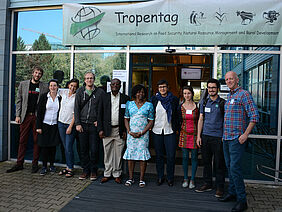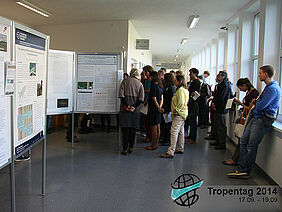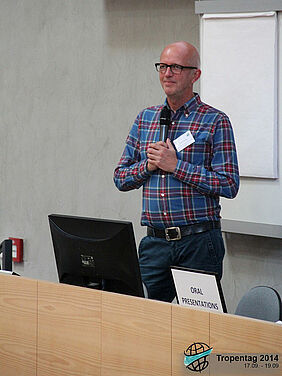Organic farming in the tropics and subtropics is still beset by major knowledge gaps. FiBL is undertaking a diverse array of projects designed to close such gaps. Projects include the "SysCom" long-term system comparison in Bolivia, India and Kenya, the "Green Cotton" project in India, the "Syprobio" project in West Africa and agricultural research conducted in Malaysia and China. The large number of contributions made by FiBL at this year’s Tropentag shows that FiBL’s research activities are fruitful in warmer climates too: eight posters and three oral presentations imparted to the expert audience many findings on organic farming in the tropics and subtropics and gave opportunities for critical debate.
The Tropentag is a conference convened annually since 1999 that not only involves presentations by scientists but also vigorous exchange with key institutions in the realm of development cooperation. The focus is on food security, natural resource management and rural development in the tropics and subtropics. This year the conference was hosted for the first time by the Faculty of Tropical AgriSciences in Prague. With 683 delegates from 60 countries, the conference enjoys high international esteem and brings together a great range and number of players in development cooperation. Young scientists play a strong role: this year 225 students and 179 doctoral candidates took part.
The "SysCom" long-term trials in the tropics were prominent in FiBL’s presentations. Contributions reported from Bolivia about first results in resistance breeding against Monilia rot, and its control in tropical agroforestry systems. Reports by FiBL experts on the Kenyan sub-project were concerned with achieving comparable yields in organic maize cropping systems, and the enhanced microbial activity of such systems. Reports from India presented various pest control agents derived from local resources, and the influence of organic cotton cultivation on the physical properties of soils.
In addition to these reports from the "SysCom" project, FiBL presented five further posters at the Tropentag. These addressed findings on the pest infestation of different cotton varieties gained in the Indian "Green Cotton" project, on the performance and disease susceptibility of cacao trees and their growth in organic agroforestry systems in Malaysia, on the influence of organic farming upon rural development in West Africa, and on the sustainability of smallholder fruit cultivation in China.
Steffen Schweizer, FiBL
Further information
Contact
Links
- tropentag.de: Homepage of the Tropentag
- blog.tropentag.de: Blog about the Tropentag from student reporters
- systems-comparison.fibl.org: Homepage of the long-term system comparison "SysCom" in Bolivia, India und Kenya.
- greencotton.org: Homepage of the "Green Cotton" projects in India.
- syprobio.net: Homepage of the project "Syprobio" in Westafrica.






